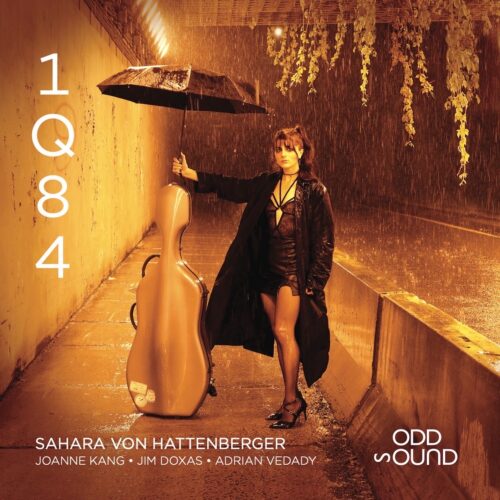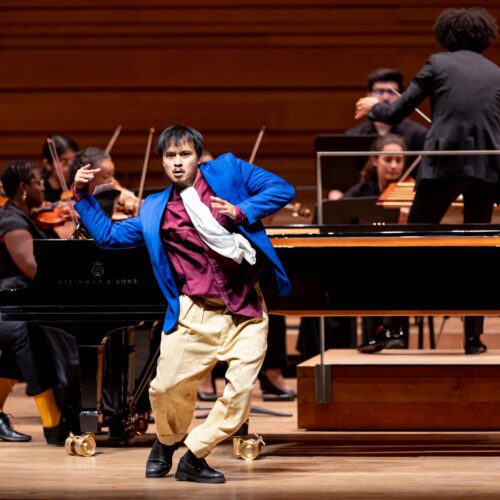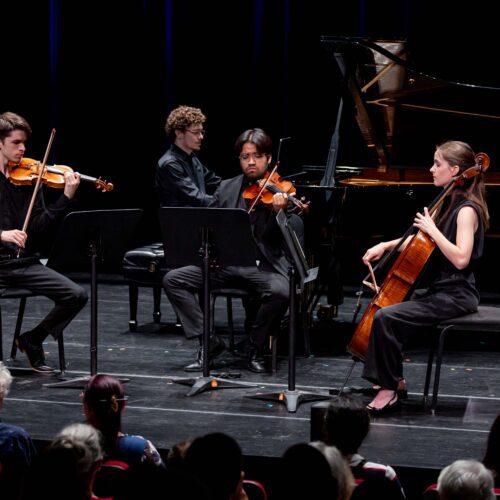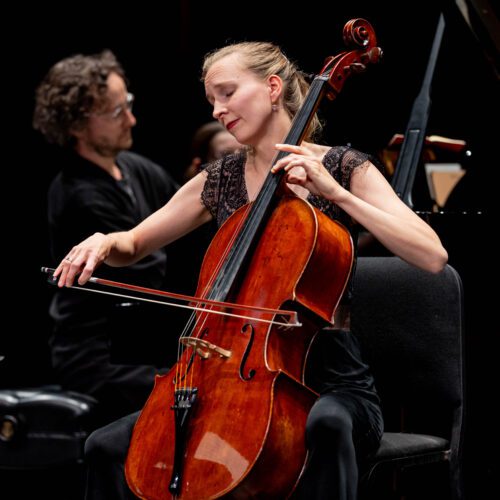There are many layers of meaning and crossover influences in this album, named after Haruki Murakami’s novel 1Q84. First of all, 1Q84 means 1984 in a Japanese word/number game (Q is pronounced kyuu, meaning the number 9). In Murakami’s novel, a young girl living in 1984 passes into a parallel world very similar to our own, except for subtle and strange differences. Sahara Von Hattenberger (how I love her name!), on her album of the same title, performs Claude Bolling’s Suite for Cello and Jazz Trio, premiered in 1984, by Yo-Yo Ma. The Suite appeared in a world troubled by an accelerating arms race between the USA and the USSR, the nuclear threat, galloping inflation, monstrous state budget deficits, awareness of the planet’s endemic pollution, high unemployment, the AIDS epidemic and so on. A social and psychological climate, a zeitgeist, dark and depressing. In stylistic contrast to the spirit of the moment, the Suite, seen from here, seems to have been a positive, optimistic reaction to the world. A pleasant, beneficent light made up of seductive tonal sonorities and a relaxed chill spirit. In short, perhaps just what the world needed at that moment.
The Suite is a substantial work. Its six movements (the form of the Baroque suite, including Bach’s) are about an hour long in all, and represent a rather fine exploration of classical and jazz styles, and especially of their potential crossovers. We often leap from metronomically regular passages (like Bach) to lyrical rubato, impressionistic colorism and impro-like gestures. The art of color and style must be mastered for all these “classical” languages, as well as for jazz swing (Bolling’s essential reference). Von Hattenberger, who studied solidly with Bryan Manker (OSM), Elizabeth Dolin and Matt Haimovitz in classical, can also boast of having had as mentors Adrian Vedady and Jim Doxas in jazz. These two giants of the Montreal scene are also present here, indomitable musical and stylistic pillars, joined by New York pianist (born in Australia) Joanne Kang.
Fast forward to the four additional pieces that complete the album’s attractive program. They embody, according to von Hattenberger, the “parallel world 2024” portion of that of 1984. There are similarities, such as warlike threats, pollution (again!) and economic challenges, but not so reassuring differences, such as the rise of extremes and internal threats to democracy, unlike in 1984. In this new gray atmosphere, does luminous new music help to ward off fate? The young cellist, based in New York and partly in Montreal, is clearly betting on it. The commissions (for they are all commissions, except for one which is an arrangement/variation on a pop song – Kate Bush’s Running Up That Hill) were intended to be in dialogue with Bolling’s Suite. Let’s read a “chamber jazz” character here, where classical and blue note music inform each other. If you like Bolling, you won’t be disoriented by Remy LeBoeuf’s Air Chrysalis (whose title refers to the cloning cocoons (!) described in 1Q84), Malcolm Sailor’s Night Path (a more agitated piece than the title suggests), Jeffrey Fong’s Rondo Squilibrato (where classical Rondo meets Italian Squilibrato (“deranged”), in an alert and humorous way) and finally Kate Bush’s arrangement of Running Up That Hill, where the original synthesizer, intended as a replacement for the cellos, is here, at last, played by the instrument in question. Remy LeBoeuf’s arrangement oscillates between a rather linear cover and a few atmospheric episodes. I would have liked a more adventurous harmonic exploration. Nevertheless, the result is pleasant.
With 1Q84, we discover a solo artist (von Hattenberger) who navigates contrasts of genre and style with ease, gifted with beautiful musicality, sound and an airy, lithe, highly precise technique..
A very nice album.
Oh, and I almost forgot: the cover photo (splendid) is a nod to photographer Robert Doisneau, who photographed his friend Maurice Baquet (a cellist) in a rather similar pose, with Baquet holding an umbrella over his cello. Robert Doisneau was awarded the Légion d’honneur in 1984. As we say in Quebec: toutte est dans toutte (literally ‘’Everything is in everything’’, meaning ‘’Everything connects together’’).
THE ALBUM WILL BE AVAILABLE OCTOBRE 18 2024
























